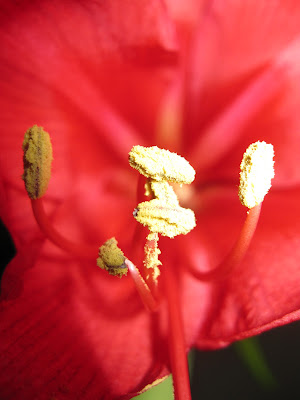For basil plants growing on my windowsills despite the cold outside;
for a well-stocked and orderly bookshelf;
for the amarillys on my counter, with four glorious red blossoms open:
I give thanks.
For summer at Berkeley four years ago,
sleeping on my friend K.'s tile floor and baking peach & plum pie;
for a midnight walk and a young stag that bounded across the sidewalk and the street,
into another garden--
For the Linguistics Institute, three weeks of glutting myself on ideas;
for dozens of papers read and learned from,
for classrooms full of linguists (students and professors)
from all over the country, gathered in one place--
For naps on the lush green lawn in the golden sun, between classes:
I give thanks.
That I can remember so clearly, that I can remember at all--
I give thanks.
For pumpkin pie and knowing how to make it, confidently;
for my mother's expertise in the kitchen
and her persistence in passing it on to me:
I give thanks.
For my own kitchen, and a house to myself,
shared with O. and the bunnies and no one else;
for O.,
for rabbits--
For friends we shared the house with
and for friendship surviving ten weeks of sharing
one bathroom and one refrigerator--
For a marriage that is so much easier and happier this Thanksgiving
than it was a year ago:
I give thanks.
For two casserole dishes of borscht in the refrigerator, and a huge pot of turkey juk,
so that I won't have to cook for days;
For Pastor T. who invited us to his Thanksgiving,
and for all the church friends there (especially the vibrant single people),
and for the scrumptious turkey and potatoes and carrots and even parsnip we ate;
for the turkey skin and bones and scraps of meat that T. did not want,
which I brought home and boiled into juk;
For the telephone that let me call my father and mother to ask for the juk recipe;
for my mother, for my father:
I give thanks.
* * *
I feel the abundance in my life today, and felt it yesterday, and will feel it tomorrow. The season is turning. It will be a strange season, but it is familiar this year. I remember the leaves changing last year, I remember the furnace we struggled to ignite. I remember learning to sleep in the same bed as O., how to regulate my body temperature so I wouldn't wake up drenched in sweat as I first did when I wore the warm pajamas I depended on during all the winters before. I remember Thanksgiving on the east coast, far from my old friends and the places I called home. Now I call this place home, too, though in my dreams I am always in California.
I remember, not so long ago, when I organized my own life without consulting anyone about my schedule. I remember feeling my life was my own. I remember watching my money carefully because there wasn't any coming in. That season has come back. Wednesday was O.'s last day of work and now we are living off of savings and my small income. Suddenly the money I bring in babysitting and working for the church really counts, and suddenly I feel so much more confident of my place in the household economy, more entitled to my opinion and my decisions. The season of confidence and independence is returning, and I am grateful (though I know something is off in my emotional logic).
Also I remember, not long ago at all, writing essays, emailing professors, impressing people. I remember understanding, teaching, explaining, leading. That season is coming back, too. I am writing my statement of purpose and remembering I've done lots of awesome things and I really am qualified, and I'm scanning and uploading my transcript and noticing with pleasure how monotonously perfect the grades are (marred only by one A-, the semester I started dating O.). I'm corresponding with my favorite professors and feeling their love. This is strange and it is familiar, and it is a promise of things to come. I do want to go to grad school. Learning is what I was made for.
The leaves have changed and they are beautiful. Soon they will fall, but when they do, I will be grateful for that beauty, too, and I will remember that the season will change again, and spring will come. It is already on its way.








